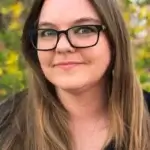Climate change has become a divisive, political issue that has extended to our classrooms. That was a key takeaway from Katie Worth’s new book, Miseducation: How Climate Change Is Taught in America.
Worth traveled to many communities to talk to children and teachers about what is being taught in schools about climate change in America’s public schools – and the political culture that shapes those classrooms. We spoke with Worth about the battle for influence happening inside schools.
What influenced you to pursue the topic of climate change in schools?
KW: Back in 2017, I went to the Marshall Islands to work on a PBS Frontline story. We were reporting about kids there who were learning about climate change. A family of one of the boys was considering moving to Oklahoma. That was one particular seed for the reporting – following how the move would impact his climate change education. Frontline has done some investigative work on climate denial and as I started poking around it was clear that there was anti climate change material specifically aimed at kids.
Can you speak a bit more about the material aimed at kids and who produces it?
KW: The fossil-fuel industry has a denial campaign that is similar to Big Tobacco. They created curricula for classrooms to deny climate change. I experienced a classroom presentation in Arkansas where someone working in the oil and gas industry noted that climate change was not something to be concerned with. I spoke with the president of the Heartland institute who told me of a plan to send books on why scientists disagree on global warming to every teacher in the nation. Many teachers have received them.
You outline in your book how climate change is approached differently in classrooms based on regional politics – do you have a personal connection to this?
KW: A few years ago, I returned to Chico, CA, a red (conservative) area where I’m from – near the 2018 Camp Fire that destroyed so much life. I spent some time at a school in Paradise, CA, observing seventh-grade students. The classroom had been displaced and was in a store. The teacher was covering climate change, and the students were completely rejecting it. Culturally, they had learned to deny it. There was such an irony in seeing an area negatively impacted by climate change with young people who believed it was a complete hoax.
Another interesting dividing line you mention is the tension that can exist between teachers …
KW: There is such a divergence of backgrounds and grasp of climate change amongst even teachers. Climate change is not something that each of us has grown up learning about. There may be an educator teaching a climate change unit, and right down the hall, there is an opposing one telling students that it’s a hoax. Educators are very much bringing different levels of grasp on the topic.
What is the solution for bridging the climate change divide in schools?
KW: I think climate change has to move beyond an issue of science and politics and be accepted as a social crisis. My book has a map of the United States that shows Republican-controlled legislative states and Democratic ones and includes a grade for each of the states and how they’re teaching climate science. Every state has its own set of academic standards. Some have adopted Next Generation Science Standards, some have amended them to their liking and omitted all things climate change, and others simply rejected them. The dividing lines have very much been drawn and will have to be bridged in a way that transcends science. Climate change should be showing up in civics classes and history classrooms as well.
What’s next for you?
KW: I would like to do more reporting on climate-related displacements and the impact that it has on communities like the one I grew up in. Prior to the fire, we experienced the five hottest summers in California’s history. But while reporting on climate change has been so rewarding, I have been pursuing it for years now. As an investigative reporter, I would also like to explore beyond it at some point.



One Response
Thank you for this article, Ms. Worth, and thank you for your work. We got a Climate Literacy Resolution passed in the Los Angeles Unified School District calling for climate education across all subjects and all grades (developmentally appropriate curricula, of course) Implementation is the next project. Any leads you have on how, say, New Jersey is organizing the roll-out of their climate education mandates, it’d be great. I am the convener and chair of the Climate Curricula Committee of the Climate Reality Project Los Angeles, who wrote and advocated to get the Resolution passed.